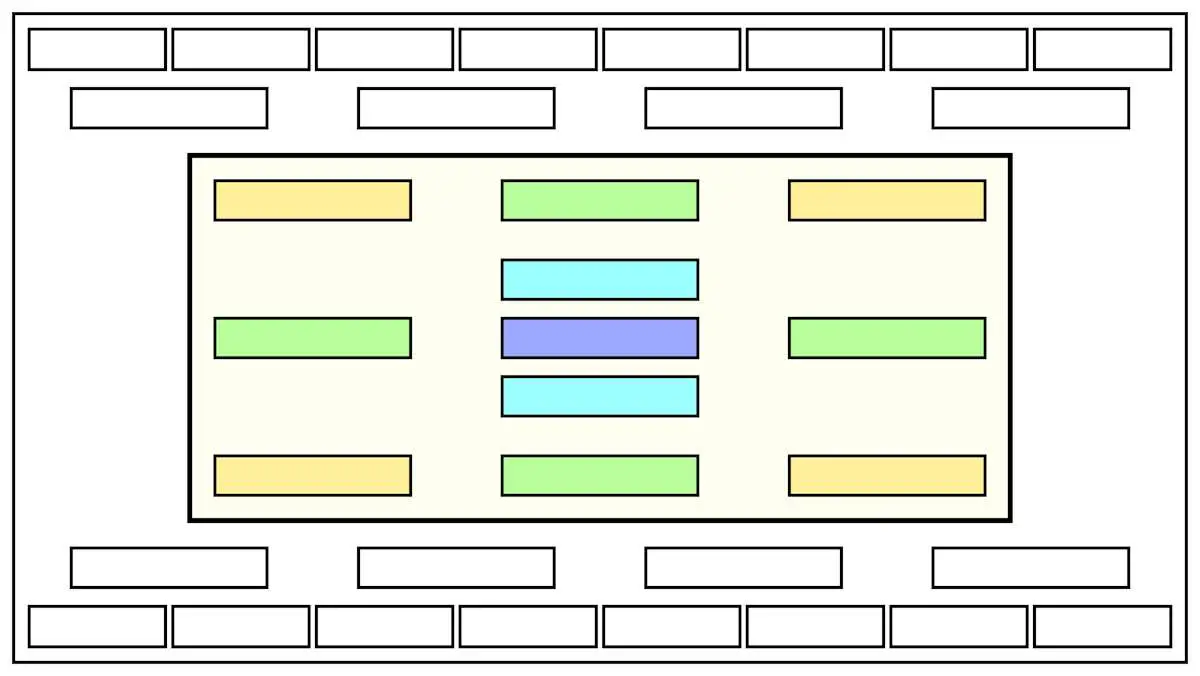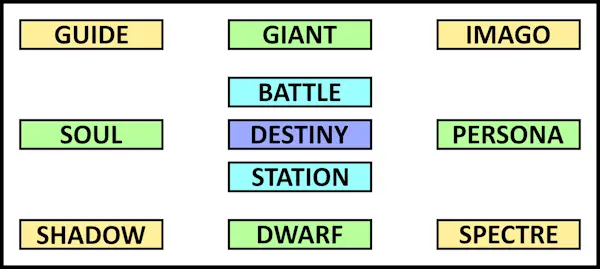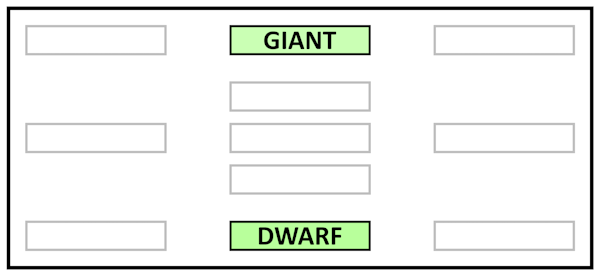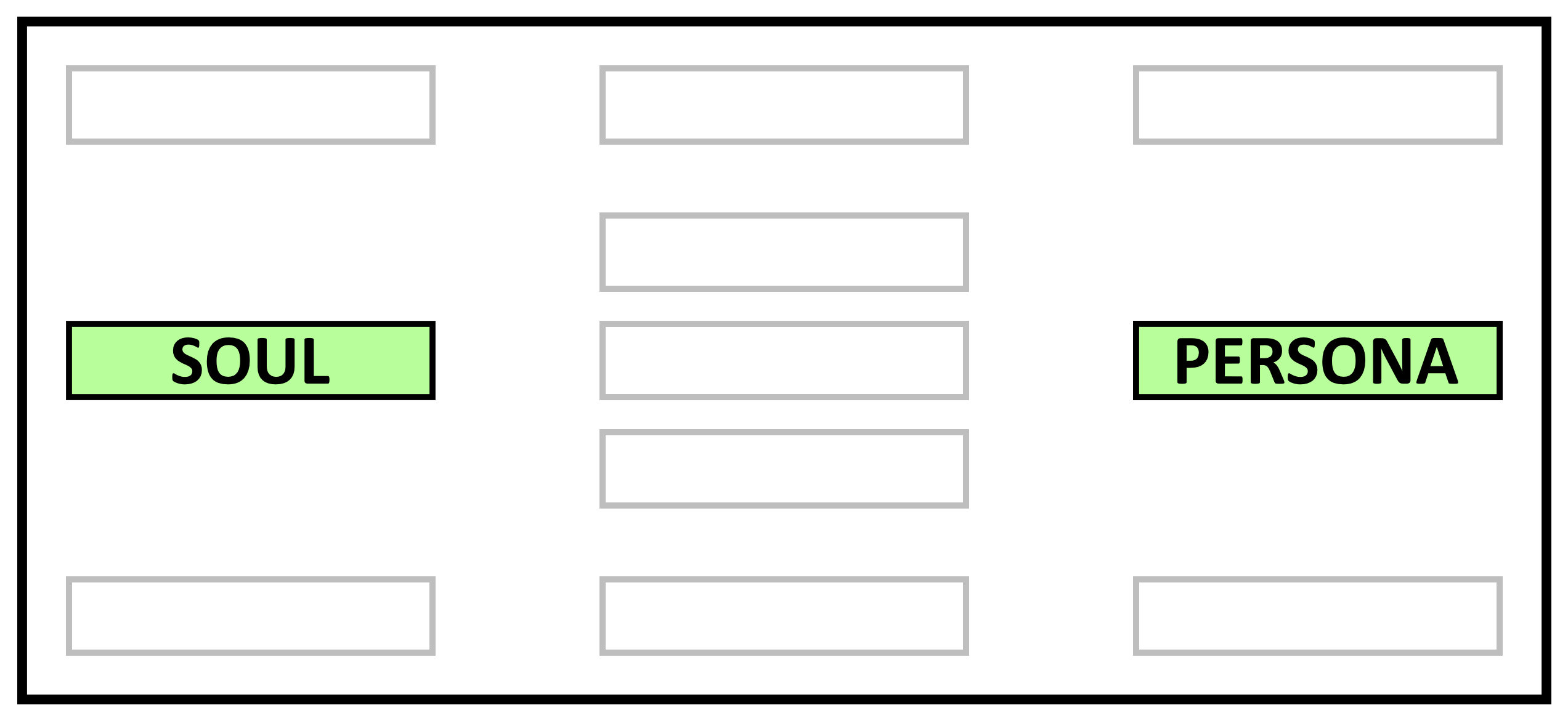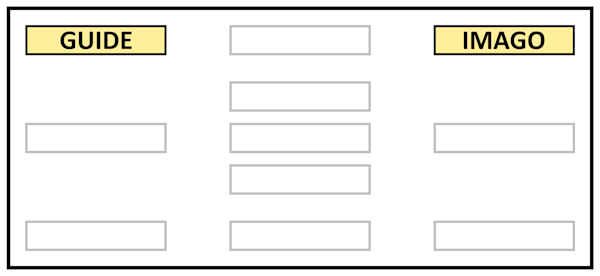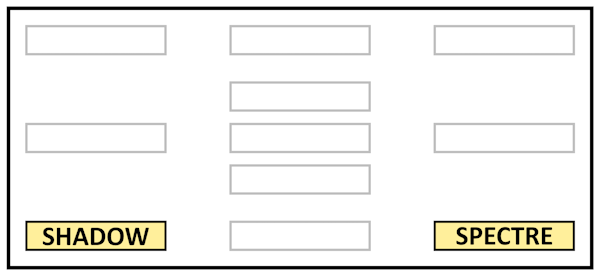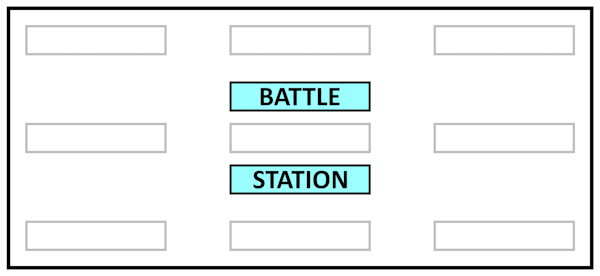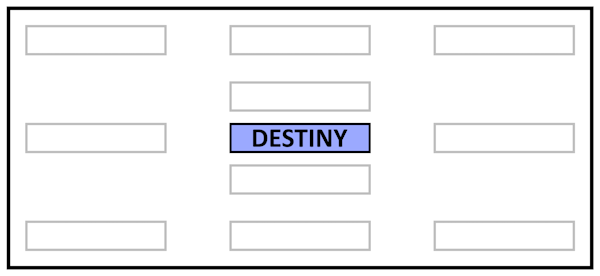Exploring Your Personality Dynamics
Preliminary Comments
The Watchword Test is essentially a method of self-analysis in which it is important to interpret your own matrix. This is mainly because only you are aware of the full facts of your situation.
Also the words you have written will often have very personal or private significance that will not be apparent to someone else. If you decide to show your matrix to others, you should exercise caution in accepting any interpretations they may suggest.
Detailed guidelines for interpretation of the Watchword Test are given in The Watchword Personality Test: A Complete Practical Guide.
Below, you will find simplified explanations that should allow you to decipher the most significant features of your test.
Dominant Theme
The Eleven Watchword Keys (Colored)
It is useful to begin by considering the main theme (if any) that is expressed in the eleven Key words (those in the central rectangle). To do this you should ask yourself what aspect of your life these eleven words seem to represent. The theme will usually give a good indication of your major current areas of concern.
Common themes are: Work, Family, Relationships, Health, Education, Ideology, Sport, Entertainment, and Feelings.
Amplifying Words
Often the personal or psychological meaning of the key words that appear in your matrix will be fairly clear to you. At other times, you may struggle to understand what a word might represent.
In order to assist the interpretation of a key word, it is often helpful, especially when the word has no obvious personal or psychological significance, to elaborate upon (or amplify) its meaning.
This amplification involves allowing a word to suggest other associations (especially ones that are personally or psychologically significant). For example, the word "RAIN" might suggest to you ideas of unhappiness, weeping, cold, dismay or, perhaps, refreshment and rebirth.
The Watchword Keys
Each of the eleven Watchword Key words is believed to have a specific psychological meaning that depends upon its position (location) on the page.
An explanation of the structural principles involved can be found at Psychological Dynamics in the Watchword Test.
The Watchword Keys
Interpreting Your Words
To interpret the meaning of your own words you should try to relate the word (or phrase) you have written in each key location (and its amplified associations) to the Key principles and primary indications.
If you have difficulty interpreting a particular Key, then an examination of the two words that were linked to form the key may help to establish its underlying meaning.
It is recommended that you examine the Keys in the following order. The first four Keys are often best interpreted in pairs, so that contrasts in meaning can be more easily identified.
GIANT and DWARF
These two Keys represent progressive and regressive tendencies in your personality or current situation.
GIANT DWARF PRINCIPLE Progression Regression INDICATIONS Driving Forces Inertial Tendencies PERSONALITY Dominant motivation
Source of strength
Creative impulses
Necessary movement or development
Features that are carrying you forward
Future possibility
Personal virtues
Jungian libido
Source of weakness
Features that are holding you back
Characteristics that should be held in check or moderated
Earlier situation
Childhood
Immature impulses
Personal vices
SOUL and PERSONA
These two Keys represent the inward and outward aspects of your personality.
SOUL PERSONA PRINCIPLE Inwardness Outwardness INDICATIONS Basic Inner Personality Basic Outer Personality PERSONALITY Private or subjective self
Thoughts and feelings
Emotional situation
Unconscious or concealed tendencies
Attitude to the unconscious
Qualities that you attribute to the opposite sex
Jungian anima or animus
Public or objective self
Mask or performances
Social roles
Physical or social situation
Conscious attitudes or tendencies
Jungian persona
GUIDE and IMAGO
These two Keys represent the progressive tendencies in, respectively, your inner world, and outer life.
GUIDE IMAGO PRINCIPLE Inner Progression Outer Progression INDICATIONS Higher Self Ego-ideals PERSONALITY Sense of inner teacher
Inner power or greatness
Intuitive insights
Dominant sense modality
Main source of inspiration or enjoyment
Inner qualities that need to be fully acknowledged or developed
Conscience
Moral principles
Ideology
Message from the unconscious
The direction of unconscious striving
Jungian mana personality
Conscious values, goals and desires
Idealized image of the self
Imagined future situation or seemingly inevitable consequence of current trends
Physical, material or social need
Jungian parental imagos
SHADOW and SPECTRE
These two Keys represent regressive forces in, respectively, your inner and outer life.
SHADOW SPECTRE PRINCIPLE Inner Regression Outer Regression INDICATIONS Repressed material Problems, anxieties and fears PERSONALITY Dark or hidden side of your nature
Disliked characteristics that you are unwilling to recognise in the self and tend to project onto others
Features that you have failed consciously to acknowledge and develop
Irrational sensitivities
Complexes
Feelings of disgust
Inner weakness
Jungian shadow
Areas where expression is difficult
Rejected values
Old preoccupations
Features that you are aware of in the self or situation, but which you dislike
Dread of becoming
Area where help is needed or sought
Escapist tendencies
Domineering force
STATION and BATTLE
Station represents your overall psychological situation at this particular time.
Battle represents aspects that need to be addressed in order to move forward.
STATION BATTLE PRINCIPLE Inner-Outer Balance or Tension Regressive-Progressive Balance or Tension INDICATIONS Sense of basic selfhood Personal task, quest or adventure PERSONALITY Current status or essential personal situation
Basic quality in the self
Continuing preoccupation
General emotional tone
Personal style
Identity problems
Jungian ego
Field of conflict
Moral dilemma
Inner turmoil
Spiritual crisis
Major cause of concern
Way forward
DESTINY
Finally, Destiny represents the anticipated resolution or outcome of your journey.
It is important to realise that this is NOT a fatalistic prediction of what will occur. Rather, Destiny suggests your psyche's "best guess" of a possible future situation, based on its assessment of the direction in which you are currently moving.
DESTINY PRINCIPLE Final Resolution INDICATIONS Realized Self PERSONALITY Projected outcome of battle or quest
Ultimate goal or value
Personal transformation
Jungian self
